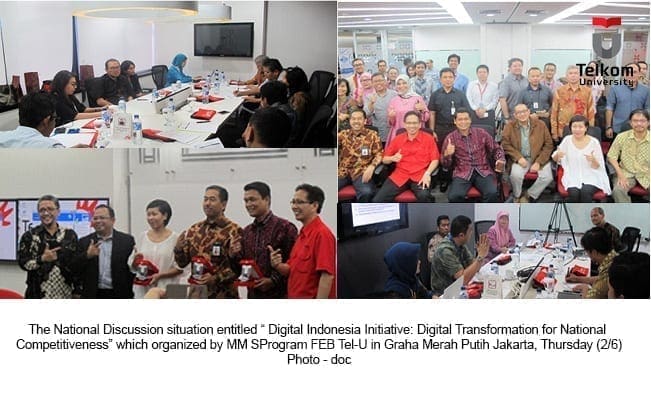JAKARTA, TEL-U – Indonesia is considered necessary to build a culture that supports the creation of a digital economy initiatives, so that academics, businessmen, companies and governments can collaborate. Culture is expected to trigger the basic skills include knowledge, skills, mindset, behavior and good habits.
It is raised in the national discussion on “Digital Indonesia Initiative: Digital Transformation for National Competitiveness” organized by Master of Management Program School of Economics and Business Telkom University (MM FEB Tel-U) in Graha Merah Putih Jakarta, Thursday (2/6).
“Until today, Indonesia has not a digital initiative, therefore we propose three platforms to become Indonesia digital initiative such as infrastructure, e-commerce and competence,” said Dean School of Economics and Business Telkom University, Dodie Tricahyono.
In the infrastructure platform, he said, there are some things produced. Among others, the government, academics and industry should to do applicable joint research “Despite all of this regulation from central government to local governments, already socialized very well,” he said.
As for the e-commerce platform, Dodie divided the digital business into 4 elements: e-commerce, e-money, shipment / logistics and big data. “Four of these elements must be well managed by a company to be successful in the digital business,” he said.
He also added, in relation to the business model, what matters is capable of reading opportunities. “Indonesia does not have a business model that is typical but can make use of local need, therefore to make a good business model, should focus on the opportunities,” he said.
According to Dodie, Indonesia has the largest start-up in ASEAN, amounting to approximately 2,000. However, of this amount, he said, no one has become a Unicorn. In the CHGR view, Indonesia, which was the highest ever turned out a majority in three areas: Travel and Transport, E-Commerce (including the Fashion and Retail), and Online Media. “Interestingly, start-ups growth reach 6.5-fold in 2020,” he added. (Purel / feb)

